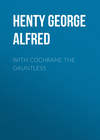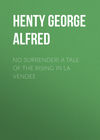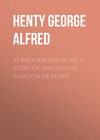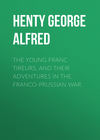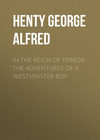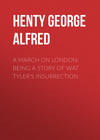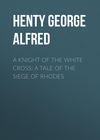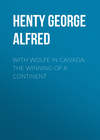Buch lesen: «Saint Bartholomew's Eve: A Tale of the Huguenot Wars», Seite 19
"That is what I concluded myself, Pierre; but I thought I would ask your opinion about it, for you have shown yourself a shrewd fellow.
"All your horses are in good condition, and it is well that I exchanged those you rode before, for some of the best of the three hundred we captured from the assailants of the chateau. Of course, you will ride one of my horses; changing the saddle every day, as your weight is so much less than mine.
"I shall not take armour with me. The extra weight tells heavily, on a long journey; and besides, a knight in full armour would attract more attention than one riding, as it would seem, for pleasure.
"Let Eustace and Roger pick the two best horses."
"When do we start, sir?"
"We must be saddled, and ready to start, by ten tonight. See that a bottle of wine, a cold fowl, and a portion of bread for each are brought along with us. We shall have a long night's ride.
"We will carry no valises. They add to the weight, and look like travelling. Let each man make a small canvas bag, and place in it a change of linen. It can be rolled up in the cloak, and strapped behind the saddle. A dozen charges, for each pistol, will be more than we shall be likely to require. Tell them to take no more. They must take their breast pieces and steel caps, of course. They can leave the back pieces behind them.
"I will go round to the hospital, and say goodbye to Henri and Jacques. They will feel being left behind, sorely."
After visiting his wounded followers, he went to the house occupied by the Prince of Navarre, where Francois also was lodged.
"So I hear you are off again, Philip," the latter said; as his cousin entered the salon where two or three of the prince's companions were sitting. "I should feel envious of you, were it not that we also are on the point of starting."
"How did you know I was going off, Francois?"
"The prince told me, half an hour since. He heard it from the Admiral. He told me he wished he was going with you, instead of with the army. He is always thirsting after adventure. He bade me bring you in to him, if you came. I said you would be sure to do so. It was useless my going out to look for you, as I could not tell what you might have to do before starting."
The young prince threw aside the book he was reading, when they entered.
"Ah, monsieur the Englishman," he said; "so you are off again, like a veritable knight-errant of romance, in search of fresh adventure."
"No, sir, my search will be to avoid adventure."
"Ah, well, you are sure to find some, whether or not. Sapristie, but it is annoying to be born a prince."
"It has its advantages also, sir," Philip said, smiling.
The prince laughed merrily.
"So I suppose; but for my part, I have not discovered them, as yet. I must hope for the future; but it appears to me, now, that it can never be pleasant. One is obliged to do this, that, and the other because one is a prince. One always has to have one's head full of politics, to listen gravely to stupidities, to put up with tiresome people, and never to have one's own way in anything. However, I suppose my turn will come; but at present, I would rather be hunting the wild goats in Navarre than pretending to be general-in-chief of an army, when everyone knows that I am not even as free to go my own way as a common soldier.
"I shall look to see you again, Chevalier Philip; and shall expect you to have some more good stories to tell me."
Having handed him his despatches, the Admiral pointed out to him the position, as far as he knew by recent report, of the forces under the Dukes of Aumale and Nemours.
"Possibly there will be other enemies," the Admiral said; "for our friends in Paris have sent me word that the Spanish ambassador has, at the king's request, written to beg the Duke of Alva, and Mansfeld, governor of Luxembourg, to send troops to aid in barring the way to the Duc de Deux-Ponts. I hope Alva has his hands full with his own troubles, in the Netherlands; and although Spain is always lavish of promises, it gives but little real aid to the king.
"Then again, on the road you may meet with bands of German mercenaries, sent by the Catholic princes to join the royal forces. As you see, the despatches are written small and, at your first halt, it will be well if you sew them in the lining of your boot. They will escape observation there, however closely you may be searched; for they are but of little bulk, and I have written them on the softest paper I could obtain, so that it will not crackle to the touch.
"I leave it to yourself to choose the route; but I think that you could not do better than take that one you before followed, when you and Laville joined me at Chatillon. Thence keep well south through Lorraine. The royal forces are at Metz. I can give you no farther instructions; for I cannot say how rapidly Deux-Ponts may move, or what route he may be obliged to take, to avoid the royal forces.
"And now farewell, lad. Remember that it is an important service you are rendering to our cause, and that much depends on your reaching Deux-Ponts; for the despatches tell him the route by which I intend to move, indicate that which he had best follow in order that he may effect a junction, and give him many details as to roads, fords, and bridges, that may be of vital importance to him."
Philip rode forty miles that night; and put up, just as daylight was breaking, at the village of Auverge. There they rested for six hours, and then rode on to Laville; where he was received with great joy by his aunt, for whom he bore a letter from Francois. After halting here for a few hours, they continued their journey.
So far they had been riding through a friendly country, but had now to travel with due precautions; journeying fast, and yet taking care that the horses should not be overworked, as sudden occasion might arise for speed or endurance; and as the journey was some eight hundred miles long, it behoved him to carefully husband the strength of the animals.
After riding another fifteen miles, they stopped for the night at a village, as Philip intended to journey by day; for his arrival at inns, early in the morning, would excite comment. The three men had been carefully instructed in the story they were to tell, at the inns where they halted. Their master was Monsieur de Vibourg, whose estate lay near the place at which they halted on the preceding night; and who was going for a short visit, to friends, at the next town at which they would arrive. If questioned as to his politics, they were to say that he held aloof from the matter, for he considered that undue violence was exercised towards the Huguenots; who, he believed, if permitted to worship in their own way, would be good and harmless citizens.
So day by day they journeyed along, avoiding all large towns, and riding quietly through small ones, where their appearance attracted no attention whatever. On the fourth day when, as usual, they had halted to dine and give their horses a couple of hours' rest, Philip heard the trampling of horses outside the inn. Going to the window he saw two gentlemen, with eight armed retainers, dismounting at the door. The gentlemen wore the Royalist colours. At the same moment, Pierre came into the room.
"I have told Eustace and Roger to finish their meal quickly, and then to get the horses saddled; to mount, and take ours quietly to the end of the village, and wait for us there, sir; so that if there should be trouble, we have but to leap through the casement, and make a short run of it."
"That is very well done, Pierre," Philip said; reseating himself at the table, while Pierre took his place behind his chair, as if waiting upon him.
The door opened, and the two gentlemen entered. They did not, as usual, remove their hats; but seated themselves at a table, and began talking noisily. Presently one made a remark in a low tone to the other, who turned round in his chair, and stared offensively at Philip. The latter continued his meal, without paying any attention to him.
"And who may you be, young sir?" the man said, rising and walking across the room.
"I am not in the habit of answering questions addressed to me by strangers," Philip said quietly.
"Parbleu, custom or no custom, you have to answer them, now. This is not a time when men can go about unquestioned. You do not wear the Royalist colours, and I demand to know who you are."
"I would wear the Royalist colours, if I were on the way to join the Royalist army," Philip replied calmly; "as at present I am not doing so, but am simply travelling as a private gentleman, I see no occasion for putting on badges."
"You have not answered my question. Who are you?"
"I do not intend to answer the question. My name is a matter which concerns myself only."
"You insolent young knave," the man said angrily, "I will crop your ears for you."
Philip rose from the table; and the other was, for a moment, surprised at the height and proportions of one whom he had taken for a mere lad.
"I desire to have no words with you," Philip said. "Eat your dinner in peace, and let me eat mine; for if it comes to cutting off ears, you may find that you had better have left the matter alone."
The gentleman put his hand to the hilt of his sword, and was in the act of drawing it when Philip, making a step forward, struck him full in the face with all his strength, knocking him backwards to the ground. His companion leapt from his seat, drawing a pistol from his belt as he did so; when Pierre sent a plate skimming across the room with great force. It struck the man in the mouth, cutting his lips and knocking out some of his front teeth. The pistol exploded harmlessly in the air, while the sudden shock and pain staggered and silenced him; and before he could recover sufficiently to draw his sword or to shout, Philip and Pierre leaped through the open casement, and ran down the street.
Chapter 16: A Huguenot Prayer Meeting
"That was a good shot, Pierre," Philip said, as they ran; "and has probably saved my life."
"I am accustomed to throw straight, sir. My dinner has frequently depended on my knocking down a bird with a stone, and it was not often that I had to go without it.
"They are making a rare hubbub, back at the inn."
Loud shouts were heard behind them.
"We have plenty of time," Philip said, as he moderated the pace at which they had started. "The men will be confused at first, knowing nothing of what it all means. Then they will have to get the horses out of the stables."
"And then they will have trouble," Pierre added.
"What trouble, Pierre?"
"I gave a hint to Eustace," Pierre said with a laugh, "that it would be just as well, before he mounted, to cut off all the bridles at the rings. A nice way they will be in, when they go to mount!"
"Did you cut their bridles for them, Eustace?" he asked, as they came up to the others.
"Ay, and their stirrup leathers, too, Pierre."
"Good, indeed!" Philip exclaimed. "Without bridles or stirrup leathers, they can scarce make a start; and it will take them some minutes to patch them up. We will ride hard for a bit. That will put us far enough ahead to be able to take any byroad, and throw them off our traces. I have no fear of their catching us by straight riding. The masters' horses may be as good as ours, but those of the men can hardly be so. Still, they might come up to us wherever we halted for the night."
They looked back, when they were some two miles from the village, and along the long straight road could make out some figures that they doubted not were horsemen, just starting in pursuit.
"They waited to mend their leathers," Pierre remarked.
"They were right, there," Philip said; "for a man can fight but poorly, without bridle or stirrups. The horses will not have been fed, so we have an advantage there. I do not think we need trouble ourselves much more about them."
"There is one thing, sir. They won't mind foundering their horses, and we have to be careful of ours."
"That is so, Pierre; and besides, at the first place they come to, they may send others on in pursuit with fresh horses. No, we must throw them off our track as soon as we can. There is a wood, a mile or so ahead; we will leave the road there."
They were riding on the margin of turf, bordering the road on either side, so as to avoid the dust that lay thick and white upon it; and they held on at an easy canter, till they reached the trees. Then, at Philip's order, they scattered and went at a walk; so as to avoid leaving marks that could be seen, at once, by anyone following them. A couple of hundred yards farther, they came upon a stream running through a wood. It was but a few inches deep.
"This will do for us," Philip said. "Now, follow me in single file, and see that your horses step always in the water."
He led them across the road, and on for half a mile. Then they left the stream and, soon afterwards, emerged from the wood and struck across the country.
"I should think they will have had pretty well enough of it, by the time they get to the wood," Philip said; "and at any rate, will lose a lot of time there. They will trace our tracks to the edge of the stream, and will naturally suppose that we will follow it up, as we struck it on the other side of the road. It is like enough they will be half an hour searching, before they find where we left the stream; and will know well enough, then, it will be hopeless trying to catch us."
"They saw we had good horses," Eustace said; "for as we led them out, one of them made the remark that they were as good looking a lot of horses as you would often see together. No doubt, at first, their leaders were so furious that they thought of nothing but mending the leathers and getting off; but when they get a check, in the wood, it is probable that someone will venture to tell them how well we are mounted, and that pursuit will be hopeless."
"Nevertheless, I think they will pursue, Monsieur Philip," Pierre said. "They did not look like men who would swallow an injury, and think no more of it. As long as there remains a single chance of discovering you, they will not give up pursuit. Of course, they have no reason for suspicion that you are anything but what you seem to be, a gentleman of the neighbourhood; and will consider that, at one or other of the towns or villages ahead of us, they are sure to hear of our passing through, and perhaps to learn who you are and where you reside. Doubtless they asked at the inn, before starting, whether you were known; and as soon as they find they are not likely to catch us by hard riding, they will make straight forward, dividing into several parties at the next place they come to, and scattering in order to obtain news of us."
"Which they will not get," Philip said, "as we will take good care to avoid passing through villages. For tonight we will sleep in the woods, as the weather is warm and pleasant."
After riding another fifteen miles, they halted in a wood. They always carried some food and wine with them, as circumstances might at any time arise that would render it imprudent for them to put up at an inn; and each also carried a feed of corn for his horse.
Leaving Pierre to unsaddle and rub down his horse, Philip walked to the farther edge of the wood, to view the country beyond. They were, he knew, not far from La Chatre; and he was not surprised to see the town, lying in a valley, to which the ground sloped down from the wood. It was about a mile and a half distant. Nearer the wood, but half a mile to the west, the towers of a fortified chateau rose from a clump of trees. The country was rich and well cultivated, and everything had an aspect of peace and comfort.
"What a hideous thing it is," Philip said to himself, "that in so fair a country people cannot live in peace together; and should fly at each other's throats, simply because they cannot agree that each shall worship God after his own fashion! It might be Canterbury, with the hills rising round it and the little river, save that it lacks the cathedral rising over it; and yet, I doubt not there are many there who live in daily peril of their lives, for there is not a town in France that has not its share of Huguenots, and they can never tell when the storm of popular fury may burst upon them."
The shades of evening were beginning to fall, when he rejoined his companions. They had already rubbed down their horses and replaced the saddles, and the animals were contentedly eating their corn.
"They look well," Philip said, as he walked from one to the other.
"Yes, sir, they are none the worse for their travel so far, and could carry us on a hard race for our lives. Shall we light a fire?"
"I do not think it is worth while, Eustace. The evening is warm, and we shall be off at daybreak. Someone passing through the wood might see the flames, and carry the news down to La Chatre, which is but a mile and a half away; and it is quite possible that those fellows we had to do with today may be there, if they are travelling the same way that we are, and may consider it likely we shall halt there for the night. At any rate, as we do not need the fire, we will run no risks."
They ate their supper and, an hour later, wrapped themselves in their cloaks and lay down. Philip was just dropping off to sleep, when Pierre touched him. He sat up with a start.
"There are some people in the wood," Pierre said.
Philip was wide awake now, and the sound of singing, at no great distance, came to his ears.
"It is a Huguenot hymn," he exclaimed. "There must be a meeting in the wood. No doubt it is some of the people from the town, who have come out to hold a secret meeting here. I will go and see it.
"Come with me, Pierre. We will go very quietly, for it would scare them terribly, did they hear anyone approaching."
Making their way noiselessly through the wood they came, after walking about three hundred yards, to the edge of an open space among the trees, where they halted. In the centre they could see, in the moonlight, a body of some seventy or eighty people gathered. Standing upon the trunk of a fallen tree was a minister who was addressing them.
"My brethren," he was saying, when they could catch his words, "this is the last time we shall meet here. We know that suspicions have already arisen that we are holding meetings, and that we do so at the peril of our lives. The search for me has been hot, for some days; and though I am willing enough to give my life in the cause of our Lord, I would not bring destruction upon you, at the present moment. Were the prospects hopeless, I should say, 'let us continue together here, till the last;' but the sky is clearing, and it may be that, ere long, freedom of worship may be proclaimed throughout France. Therefore it is better that, for a time, we should abstain from gathering ourselves together. Even now, the persecutors may be on our track."
"Pierre," Philip whispered, "do you go over in that direction, until you come to the edge of the wood. If you see any signs of men moving about, run quickly to the others, and bring the horses up here."
"I had better go back there first, had I not, Monsieur Philip, and bring the men and horses along with me to the edge of the wood? For I might lose a quarter of an hour in searching for them."
"That would be the best plan, Pierre. Should you hear a sudden noise here, hurry in this direction, and I will come to meet you. It may well be that, guessing the Huguenots would place someone on watch towards the town, the Catholics may, if they come, approach from the other side. Should you see anyone coming, give a loud shout, at once. It will act as a warning to these people, and enable them to scatter and fly, before their foes arrive."
For an hour the preacher continued to address his hearers, exhorting them to stand firm in the faith, and to await with patience the coming of better days. They were not more than twenty paces away from the spot where Philip was standing, and in the moonlight he could clearly see the faces of the assembly, for the preacher was standing with his back to him. From their dress, he judged that most of them belonged to the poorer classes; though three or four were evidently bourgeois of the well-to-do class.
Seated on the trunk on which the preacher was standing, and looking up at him so that her profile was clearly visible to Philip, sat a young girl, whose face struck Philip as of singular beauty. The hood of the cloak in which she was wrapped had fallen back from her head, and her hair looked golden in the moonlight. She was listening with rapt attention. The moonlight glistened on a brooch, which held the cloak together at her throat. A young woman stood by her; and a man, in steel cap and with a sword at his side, stood a pace behind her. Philip judged that she belonged to a rank considerably above that of the rest of the gathering.
When the address had concluded, the preacher began a hymn in which all joined. Just as they began, Philip heard the crack of a stick among the trees. It was not on the side from which Pierre would be coming. He listened attentively, but the singing was so loud that he could hear nothing; except that once a clash, such as would be made by a scabbard or piece of armour striking against a bough, came to his ears.
Suddenly he heard a shout.
"That is Pierre!" he exclaimed to himself, and ran forward into the circle.
There was a cry of alarm, and the singing suddenly stopped.
"I am a friend," he exclaimed. "I have come to warn you of danger. There are men coming in this direction from the town."
"My brethren, we will separate," the minister said calmly. "But first, I will pronounce the benediction."
This he did solemnly, and then said:
"Now, let all make through the wood and, issuing from the other side, return by a circuit to the town.
"Mademoiselle Claire, I will accompany you to the chateau."
At this moment Philip heard horses approaching.
"This way, Pierre," he shouted, and ran to meet them.
Fifty yards away he came upon them, and leapt into his saddle.
"See to your weapons, lads," he said. "I believe there are others in the wood already."
He was within twenty yards of the clearing when he heard a sudden shout of:
"Down with the Huguenot dogs! Kill! Kill!"
He dashed forward, followed by his men. A mob of armed men, headed by two or three horsemen, had burst from the opposite side of the glade and were rushing upon the Huguenots, who had just broken up into small groups.
They stood, as if paralysed, at this sudden attack. No cry or scream broke from the women. Most of these threw themselves upon their knees. A few of the men followed their example, and prepared to die unresistingly. Some sprang away among the trees, and above the din the preacher's voice was heard commencing a Huguenot hymn beginning, "The gates of heaven are opened;" in which, without a moment's hesitation, those who remained around him joined.
In a moment, with savage shouts and yells, their assailants were upon them, smiting and thrusting. With a shout, Philip spurred forward from the other side. He saw at once that, against such numbers, he and his three followers could do nothing; but his rage at this massacre of innocent people–a scene common enough in France, but which he now for the first time witnessed–half maddened him.
One of the horsemen, whom he recognized at once as the man Pierre had knocked down with the plate, rode at the girl Philip had been watching; and who was standing, with upturned face, joining in the hymn. The man attending her drew his sword, and placed himself in the way of the horseman; but the latter cut him down, and raised the sword to strike full at the girl, when Philip shot him through the head.
Instantly another horseman, with a shout of recognition, rode at him. Philip thrust his still smoking pistol in his holster, and drew his sword.
"This is more than I hoped for," his assailant said, as he dealt a sweeping blow at him.
"Do not congratulate yourself too soon," Philip replied, as he guarded the blow and, lunging in return, the point glided off his adversary's armour.
He parried again; and then, with a back-handed sweep, he struck his opponent on the neck with his whole force. Coming out to take part in a Huguenot hunt, in which he expected no opposition, the knight had left his helmet behind him; and fell from his horse, with his head half severed from his body.
In the meantime the two men-at-arms and Pierre had driven back the mob of townsmen; who, however, having massacred most of the unresisting Huguenots, were surging up round them.
"Give me your hand, mademoiselle, and put your foot on mine," Philip exclaimed to the girl, who was still standing close to him.
"Pierre," he shouted as, bewildered by the uproar, the girl instinctively obeyed the order, "take this woman up behind you."
Pierre made his horse plunge, and so freed himself from those attacking him. Then, reining round, he rode to Philip's side, and helped the companion of the young lady to the croup of his saddle; Philip dashing forward, to free his two followers from their numerous assailants.
"To the left, Eustace;" and, cutting their way through the crowd, the three horsemen freed themselves and, as they dashed off, were joined by Pierre.
"We must work back by the way we came, Monsieur Philip," Pierre said. "There is another body coming up in front, to cut off fugitives; and that was why I shouted to you."
In a minute or two they were out of the wood. Men were seen running across the fields, but these they easily avoided.
"Now turn again, and make straight for La Chatre," Philip said. "We can cross the bridge, and ride through the place without danger. Those who would have interfered with us are all behind us."
As he had expected, the place was perfectly quiet. The better class of the bourgeois were all asleep, either ignorant or disapproving of the action of the mob. As soon as they were through the town, Philip checked the speed of his horse.
"Mademoiselle," he said, "I am as yet in ignorance of your name. I am the Chevalier Philip Fletcher, an English gentleman fighting for the cause of the reformed religion, under Admiral Coligny. I am on my way east, with important despatches; and I was bivouacking with my three followers in the wood, when I was attracted by the singing.
"Judging, from the words of the minister, that there was danger of an attack, I put one of my men on the watch; while I myself remained in the wood by your meeting place. Unfortunately, the sound of the last hymn you sang drowned the noise made by the party that assailed you. However, happily we were in time to save you and your servant; and our sudden appearance doubtless enabled many to escape, who would otherwise have been massacred."
The girl had burst into a fit of sobbing, as soon as the danger was over; but she had now recovered.
"My name is Claire de Valecourt, monsieur," she said. "My father is with the Admiral. He will be deeply grateful to you for saving my life."
"I have the honour of knowing the Count de Valecourt, mademoiselle; and am glad, indeed, that I have been able to be of service to his daughter. The count is one of the gentlemen who act as guardians to the Prince of Navarre, whom I have also the honour of knowing.
"And now, what are your wishes? It is not too late even now, should you desire it, for me to take you back to the chateau."
"I should be defenceless there, sir," she said. "There are but a score of men-at-arms and, though formerly a place of some strength, it could not be defended now. See, sir, it is too late already."
Philip looked round, and saw a bright light suddenly rising from the clump of trees on which the chateau stood. He gave an exclamation of anger.
"It cannot be helped," she said quietly. "It is but a small place. It was part of my mother's dower. Our estates, you know, are in Provence. My father thought I should be safer, here, than remaining there alone while he was away. We have always been on good terms with the townspeople here, and they did not interfere with those of our religion during the last war; so we thought that it would be the same now. But of late some people have been here, stirring up the townsmen; and some travelling friars preached in the marketplace, not long since, upbraiding the people with their slackness in not rooting us out altogether.
"A month ago, one of the persecuted ministers came to the chateau at night, and has been concealed there since. Seeing that there will be no minister here for some time, word was sent round secretly, to those of our religion in the town, and twice a week we have had meetings in the wood. Many of the servants of the chateau are Catholics, and of the men-at-arms, the majority are not of our faith. Therefore I used to steal out quietly with my attendant. We heard, two days ago, that a rumour of the meetings had got about; and tonight's was to have been the last of them."
"And now, mademoiselle, what are your wishes? Have you any friends with whom I could place you, until you could rejoin your father?"
"None near here, monsieur. I have always lived in the south."
"I should not have taken you for a lady of Provence," Philip said. "Your hair is fair, and you have rather the appearance of one of my own countrywomen, than of one born in the south of France."
"I am partly of northern blood," she said. "My mother was the daughter of Sir Allan Ramsay, a Scottish gentleman who took service in France, being driven from home by the feuds that prevailed there. I knew but little about her, for she died when I was a child; and my father, who loved her greatly, seldom speaks to me of her."
Philip rode for some time in silence.
"I feel that I am a terrible burden on your hands, monsieur," she said quietly, at last; "but I will do anything that you think best. If you set us down, we will try and find refuge in some peasant's hut; or we can dress ourselves as countrywomen, and try to make our way westward to La Rochelle."











